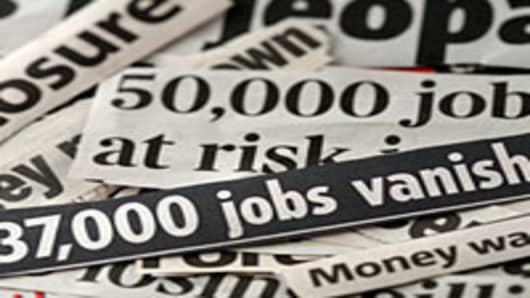A plunge in recent economic data puts the probability of a double-dip recessionabove 80 percent, according to modeling by Bank of America Merrill Lynch released Wednesday, reflecting the toll the U.S. debt downgrade, Europe’s woes and stock market volatility has taken on economic activity.
To be sure, the firm’s economic team warned more data is needed for it to raise its overall official prediction of a recession that high. Still, the recent dismal readings from the Philadelphia Federal Reserve and the University of Michigan were enough for Merrill to raise its overall probability of a contraction in the next year to 40 percent from 35 percent at the start of this month.
A survey of manufacturing in the Philadelphia region plunged to its lowest level since March 2009, according to the Fed last week. Consumer confidence is at its lowest level since May 1980, according to a Thomson Reuters/University Michigan survey released on August 12. A revision of this survey will be released Friday.
The Philly Fed puts a recession probability at 85.7 percent, while the consumer survey puts contraction chances at 80 percent, according to Bank of America's probability model, which uses a so-called Bayesian technique that “tests if the economy is in a recession based on the interaction of variables that are associated with turns in the business cycle.”
“More timely consumer and business sentiment indicators dropped in August in response to a range of bad news,” said Michael Hanson, one of the firm’s economists, in the note. “While we concede the risks are rising, a recession is not baked in the cake. If the economy can avoid further shocks, we would expect a modest bounce in growth into the end of the year.”
According to their data, the Philly Fed has accurately forecast four of the last seven recessions. The older Michigan survey has accurately signaled three of the last eight recessions.
“It’s a 100 percent chance,” said Peter Schiff, CEO & Chief Global Strategist of Euro Pacific Capital. “In fact the recession might have already started.”
The Merrill economics team is less pessimistic than Schiff and is quick to point out that since 1990, the Philly Fed has signaled recessions six times that have never come to fruition. Therefore, a sudden drop of this magnitude is not unusual for this indicator.
Still, the latest economic data raises the stakes for Federal Reserve Chairman Ben Bernanke’s speech Friday from the central bank’s Jackson Hole summit. Many investors are hoping the data will push the Fed Chief to signal a new type of stimulus , however others believe Bernanke will simply say that they stand ready to do anything to save the economy, but more data is needed.
Weekly jobless claims released Thursday unexpectedly rose to 417,000, above economists’ estimates and further validating the data from earlier in the month.
Ironically, the most accurate recession indicator that could be used by Bernanke has likely been skewed by the Federal Reserve’s pledge to keep rates at near zero into mid-2013.
An inverted yield curve, when the 3-month Treasury yieldrises above the 10-year Treasury rate, has accurately predicted seven of the last eight recessions with just one false positive since 1960, according to Bank of America.
“The yield curve has definitely been distorted by the Fed as it’s tough to come near inversion when short-term rates remain near zero,” said Jim Iuorio of TJM Institutional Services. “This morning’s jobs numbers pushed my odds to 60/40 in favor of recession.”
For the best market insight, catch 'Fast Money' each night at 5pm ET, and the ‘Halftime Report’ each afternoon at 12:30 ET on CNBC. Follow Fast Money at twitter.com/cnbcfastmoney
______________________________________________________
Got something to say? Send us an e-mail at fastmoney-web@cnbc.com and your comment might be posted on the Rapid Recap! If you'd prefer to make a comment, but not have it published on our Web site, send your message to fastmoney@cnbc.com.



